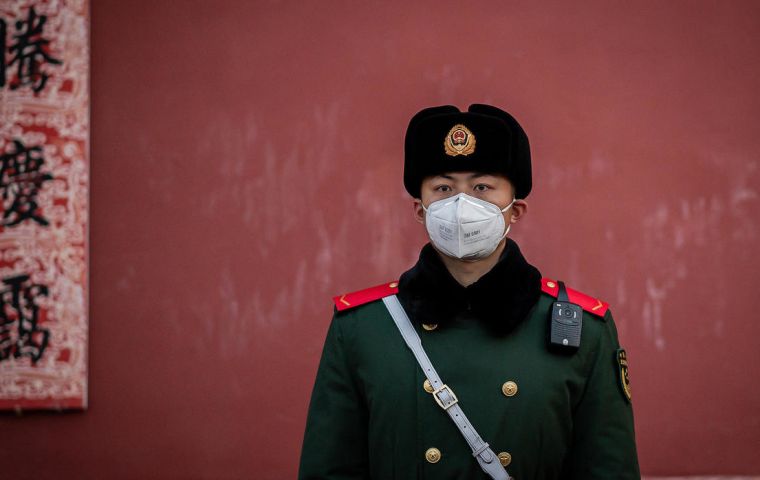MercoPress. South Atlantic News Agency
Beijing's lockdown ahead of a possible resurgence of coronavirus infection
 After largely getting the outbreak under control, China has banned foreigners from entering the country as authorities fret over an increase in imported cases
After largely getting the outbreak under control, China has banned foreigners from entering the country as authorities fret over an increase in imported cases  Beijing has imposed a strict 14-day quarantine on people arriving from other parts of China, regardless of whether they test negative for COVID-19
Beijing has imposed a strict 14-day quarantine on people arriving from other parts of China, regardless of whether they test negative for COVID-19  The ruling Communist Party postponed its once-a-year congress, known as the “two sessions”, in March
The ruling Communist Party postponed its once-a-year congress, known as the “two sessions”, in March Beijing has virtually walled itself off to outsiders with drastic measures to protect China's seat of power against the threat of a second wave of coronavirus infections from other regions. After largely getting the outbreak under control, China has banned foreigners from entering the country as authorities fret over an increase in cases imported from abroad - though most have been Chinese citizens.
After largely getting the outbreak under control, China has banned foreigners from entering the country as authorities fret over an increase in cases imported from abroad - though most have been Chinese citizens.
But Beijing has gone a step further, imposing a strict 14-day quarantine on people arriving from other parts of China, regardless of whether they test negative for COVID-19 - a measure not required in other cities.
The ruling Communist Party postponed its once-a-year congress, known as the “two sessions”, in March and experts said it likely wants to make sure the thousands of delegates who participate are not at risk before a new date is set.
“Strengthening management of people returning to Beijing has become the most critical priority, otherwise it is impossible to create the right conditions for the two sessions to start,” said Ma Liang, a professor at Renmin University's School of Public Administration and Policy.
The measures are ultimately meant to shield the Communist Party elite from the virus, said Alfred Wu, associate professor at the National University of Singapore's Lee Kwan Yew School of Public Policy.
“In this moment, the central government and core leadership are highly protected, so ordinary people will have to pay the price,” he said.
Beijing has imposed a mandatory 14-day quarantine on all returning students, who must test negative to attend school. All hotel guests must test negative within seven days prior to their stay.
The measures have already deterred some from going back. The toughest conditions are reserved for people travelling to Beijing from Wuhan, the central city where the virus first emerged late last year.
Those leaving the city, whose months-long lockdown was lifted on Apr 8, must test negative within seven days before their return date, undergo a 14-day quarantine once they arrive, and test negative again in order to be released.
Other cities only require those from Wuhan and Hubei province to produce a green health code on a special app and a negative nucleic acid test result.
They must first request to return to Beijing through an app when they receive their negative diagnosis.
If approved, they have to submit another request to purchase train tickets to the capital, which are limited to 1,000 seats per day on two services.
There are an estimated 11,000 Beijing residents stranded in Wuhan, officials said last week, but the city has lately seen a surge in asymptomatic cases which are notoriously difficult to detect.




Top Comments
Disclaimer & comment rulesCommenting for this story is now closed.
If you have a Facebook account, become a fan and comment on our Facebook Page!